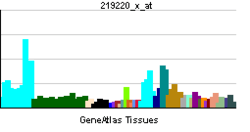MRPS22
28S ribosomal protein S22, mitochondrial is a protein that in humans is encoded by the MRPS22 gene.[4][5]
Mammalian mitochondrial ribosomal proteins are encoded by nuclear genes and help in protein synthesis within the mitochondrion. Mitochondrial ribosomes (mitoribosomes) consist of a small 28S subunit and a large 39S subunit. They have an estimated 75% protein to rRNA composition compared to prokaryotic ribosomes, where this ratio is reversed. Another difference between mammalian mitoribosomes and prokaryotic ribosomes is that the latter contain a 5S rRNA. Among different species, the proteins comprising the mitoribosome differ greatly in sequence, and sometimes in biochemical properties, which prevents easy recognition by sequence homology. This gene encodes a 28S subunit protein that does not seem to have a counterpart in prokaryotic and fungal-mitochondrial ribosomes. This gene lies telomeric of and is transcribed in the opposite direction from the forkhead box L2 gene. A pseudogene corresponding to this gene is found on chromosome Xq.[5]
References
- ↑ "Diseases that are genetically associated with MRPS22 view/edit references on wikidata".
- ↑ "Human PubMed Reference:".
- ↑ "Mouse PubMed Reference:".
- ↑ Crisponi L, Deiana M, Loi A, Chiappe F, Uda M, Amati P, Bisceglia L, Zelante L, Nagaraja R, Porcu S, Ristaldi MS, Marzella R, Rocchi M, Nicolino M, Lienhardt-Roussie A, Nivelon A, Verloes A, Schlessinger D, Gasparini P, Bonneau D, Cao A, Pilia G (Feb 2001). "The putative forkhead transcription factor FOXL2 is mutated in blepharophimosis/ptosis/epicanthus inversus syndrome". Nat Genet. 27 (2): 159–66. doi:10.1038/84781. PMID 11175783.
- 1 2 "Entrez Gene: MRPS22 mitochondrial ribosomal protein S22".
Further reading
- Koc EC, Burkhart W, Blackburn K, et al. (2000). "A proteomics approach to the identification of mammalian mitochondrial small subunit ribosomal proteins". J. Biol. Chem. 275 (42): 32585–91. doi:10.1074/jbc.M003596200. PMID 10938081.
- Cavdar Koc E, Burkhart W, Blackburn K, et al. (2001). "The small subunit of the mammalian mitochondrial ribosome. Identification of the full complement of ribosomal proteins present". J. Biol. Chem. 276 (22): 19363–74. doi:10.1074/jbc.M100727200. PMID 11279123.
- Kenmochi N, Suzuki T, Uechi T, et al. (2001). "The human mitochondrial ribosomal protein genes: mapping of 54 genes to the chromosomes and implications for human disorders". Genomics. 77 (1–2): 65–70. doi:10.1006/geno.2001.6622. PMID 11543634.
- Strausberg RL, Feingold EA, Grouse LH, et al. (2003). "Generation and initial analysis of more than 15,000 full-length human and mouse cDNA sequences". Proc. Natl. Acad. Sci. U.S.A. 99 (26): 16899–903. doi:10.1073/pnas.242603899. PMC 139241
 . PMID 12477932.
. PMID 12477932.
- Zhang Z, Gerstein M (2003). "Identification and characterization of over 100 mitochondrial ribosomal protein pseudogenes in the human genome". Genomics. 81 (5): 468–80. doi:10.1016/S0888-7543(03)00004-1. PMID 12706105.
- Crisponi L, Uda M, Deiana M, et al. (2004). "FOXL2 inactivation by a translocation 171 kb away: analysis of 500 kb of chromosome 3 for candidate long-range regulatory sequences". Genomics. 83 (5): 757–64. doi:10.1016/j.ygeno.2003.11.010. PMID 15081106.
- Gerhard DS, Wagner L, Feingold EA, et al. (2004). "The Status, Quality, and Expansion of the NIH Full-Length cDNA Project: The Mammalian Gene Collection (MGC)". Genome Res. 14 (10B): 2121–7. doi:10.1101/gr.2596504. PMC 528928
 . PMID 15489334.
. PMID 15489334.
- Guo D, Han J, Adam BL, et al. (2005). "Proteomic analysis of SUMO4 substrates in HEK293 cells under serum starvation-induced stress". Biochem. Biophys. Res. Commun. 337 (4): 1308–18. doi:10.1016/j.bbrc.2005.09.191. PMID 16236267.
- Otsuki T, Ota T, Nishikawa T, et al. (2007). "Signal sequence and keyword trap in silico for selection of full-length human cDNAs encoding secretion or membrane proteins from oligo-capped cDNA libraries". DNA Res. 12 (2): 117–26. doi:10.1093/dnares/12.2.117. PMID 16303743.
- Ewing RM, Chu P, Elisma F, et al. (2007). "Large-scale mapping of human protein–protein interactions by mass spectrometry". Mol. Syst. Biol. 3 (1): 89. doi:10.1038/msb4100134. PMC 1847948
 . PMID 17353931.
. PMID 17353931.

 . PMID 12477932.
. PMID 12477932. . PMID 15489334.
. PMID 15489334. . PMID 17353931.
. PMID 17353931.